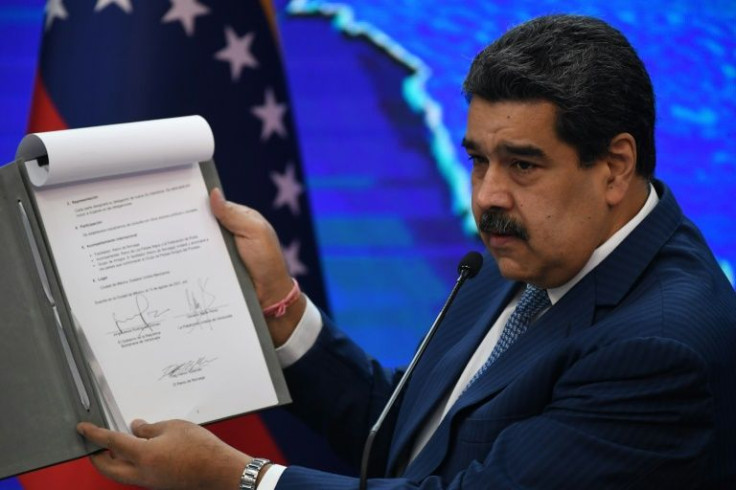Ban On Russian Oil Forces US To Court Maduro

In order to fulfill its energy needs in the wake of the ban on Russian oil, the U.S. started to court Venezuela's Maduro, considered untouchable until now.
Since the U.S. started the campaign to kick out the Russian oil it simultaneously started looking for the alternative. The Joe Biden administration March 8 banned the import of Russian oil into the U.S. in retaliation for the Ukraine invasion and instead is courting Venezuela, a strong Russian ally, which has been under U.S. oil sanctions since 2019.
U.S. is making efforts to compensate energy supplies worldwide that have dried up following the sanctions imposed by the U.S. and the European Union.
For the first bilateral talks in years, U.S. officials arrived in Caracas and met President Maduro March 5.
The U.S. has made clear that its priority was to secure supplies for the U.S. and any relaxation in U.S. sanctions would be tied to Venezuela, an OPEC member, shipping oil directly to the U.S. shores.
Since serving diplomatic ties with Caracas, Washington had refused to deal with the Maduro government and instead treated opposition leader Juan Guaido as the country's legitimate president along with 60 countries that rejected Maduro's 2018 re-election by terming it fraudulent.
The U.S. imposed a battery of sanctions on Caracas to make life miserable for Maduro and to remove him from power. A 2019 sanction prevents Venezuela from trading its crude oil, which earns 96 percent of the country's revenues, on the U.S. market. To tide over the U.S. sanctions, Maduro had sought diplomatic help from Russia, as well as from Iran and China.
The U.S. wants free presidential elections and the release of Americans jailed in Venezuela, while Maduro is looking for the lifting of sanctions.
In a televised appearance March 7 Maduro confirmed the meeting and described it as "respectful, cordial and diplomatic" without divulging the details.
"We did it in the presidential office," he said. "We had almost two hours talking."
Since the U.S. began reviewing its sanctions on Venezuela last month one of the condition was the talks between Maduro's government and the opposition moved forward. The president has also announced the resumption of talks with the opposition that was stalled five months ago. Opposition leader Guaido's office also held a meeting with the U.S. delegation.
Though the talks made little progress as the U.S. is exploring the prospects of peeling Maduro away from the Russian influence, both the parties agreed to hold further talks. Maduro had extended Russian President Vladimir Putin his strong support in the wake of the Ukraine invasion Feb. 24.
Oil prices increased by another 5 percent March 8 to $128 per barrel on the U.S. import ban on Russia, which was 670,000 barrels per day in 2021. Britain is also planning to do away with Russian imports by year-end.
The plan is to make refiners on the U.S. Gulf Coast that are importing Russian barrels, processing Venezuelan heavy oil and fuel. Before the U.S sanctions, refineries on the U.S. Gulf Coast processed Venezuela's heavy grades of crude.
If a deal is sealed with the Maduro administration, the California-based Chevron Corp, which has a special license to maintain a low-level presence in Venezuela, could be the first beneficiary.
After the U.S. broke off relations with Maduro, he was treated as a bad guy and was indicted in a New York drug trafficking case. President Biden has been making an unsuccessful campaign to unseat Maduro which he inherited from the Trump administration.
The US officials met Maduro after months of quiet backchannel talks initiated by intermediaries such as lobbyists, Norwegian diplomats, and international oil executives.
Suddenly, Maduro became an acceptable person for the U.S. To reciprocate the U.S. goodwill, Maduro released two jailed U.S. citizens March 8.
Salvadoran President Nayib Bukele, who has strained ties with the U.S., summed it up best when he tweeted, "The U.S. government decides who is the bad guy and who is the good guy and also when the bad guy becomes good and the good guy becomes bad."
One of the freed prisoners is Gustavo Cardenas, who was arrested in 2017. The other was a Cuban American, identified as Jorge Alberto Fernández.
Since Venezuela has the largest source of oil reserves, the U.S. does not want Maduro to give it away to the Russians and Chinese.





